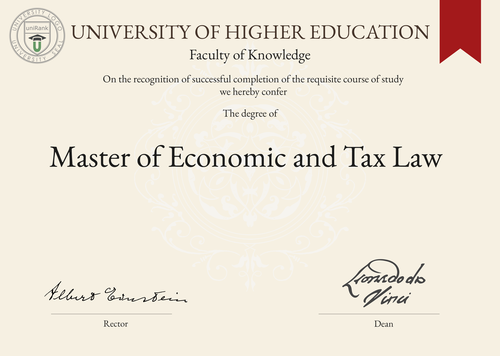
Master of Economic and Tax Law (M.Econ.Tax.Law)
Guide to Master of Economic and Tax Law Program/Course/Degree
Master of Economic and Tax Law (M.Econ.Tax.Law)

Program Name:
Master of Economic and Tax LawProgram or Degree abbreviation:
M.Econ.Tax.LawDuration range:
The duration of the program typically ranges from 1 to 2 years.Tuition range:
The tuition fees for the program can vary depending on the chosen country or university. It is recommended to check with specific institutions for accurate information.Overview:
The Master of Economic and Tax Law program is designed to provide students with a comprehensive understanding of the legal and economic aspects of taxation. It equips graduates with the necessary skills and knowledge to navigate the complex field of tax law and contribute to the development of effective tax strategies.Curriculum Overview by year:
The curriculum is structured to cover various aspects of economic and tax law. The specific courses offered may vary by university, but typically include subjects such as tax policy, international taxation, corporate taxation, tax planning and legal frameworks.Key Components:
The key components of the program include gaining a deep understanding of tax legislation, developing analytical and problem-solving skills in tax-related matters and acquiring knowledge of economic principles and their application in taxation.Career Prospects:
Graduates of the Master of Economic and Tax Law program have diverse career opportunities. They can pursue roles in law firms, accounting firms, government agencies, multinational corporations, or work as tax consultants. Potential job titles include tax lawyer, tax advisor, tax analyst, or tax manager.Salary Expectations:
Salary expectations for graduates of the program can vary depending on factors such as location, experience and the specific industry. Generally, professionals in the field of economic and tax law earn competitive salaries. For a more accurate understanding of salary expectations, you can utilize the Job Sites Search Engine, from our sister site jobRank, which searches over 4,600 job sites worldwide. Make sure to specify not only the job title but also the country you are interested in.Conclusions:
It is important to note that the duration, tuition fees, curriculum, key components, career prospects and salary expectations of the Master of Economic and Tax Law program can vary based on the chosen country or location of study, as well as the university offering the program. Prospective students are advised to research and compare different options to find the best fit for their individual needs. Visitors can search for institutions offering this specific degree, the Master of Economic and Tax Law, anywhere in the world through the uniRank World Universities Search Engine.World Universities Search Engine
search for Master of Economic and Tax Law (M.Econ.Tax.Law) and add the Location (country, state etc.) or specific University you are interested in studying at.
Query examples:
- Master of Economic and Tax Law (M.Econ.Tax.Law) United States
- Master of Economic and Tax Law (M.Econ.Tax.Law) United Kingdom online
- Master of Economic and Tax Law (M.Econ.Tax.Law) Australia international students
- Master of Economic and Tax Law (M.Econ.Tax.Law) University of California
- Master of Economic and Tax Law (M.Econ.Tax.Law) University of London tuition fees
- Master of Economic and Tax Law (M.Econ.Tax.Law) University of Sydney scholarships
Share Program/Course
Interesting? Share this program/course/degree info with your friends now.